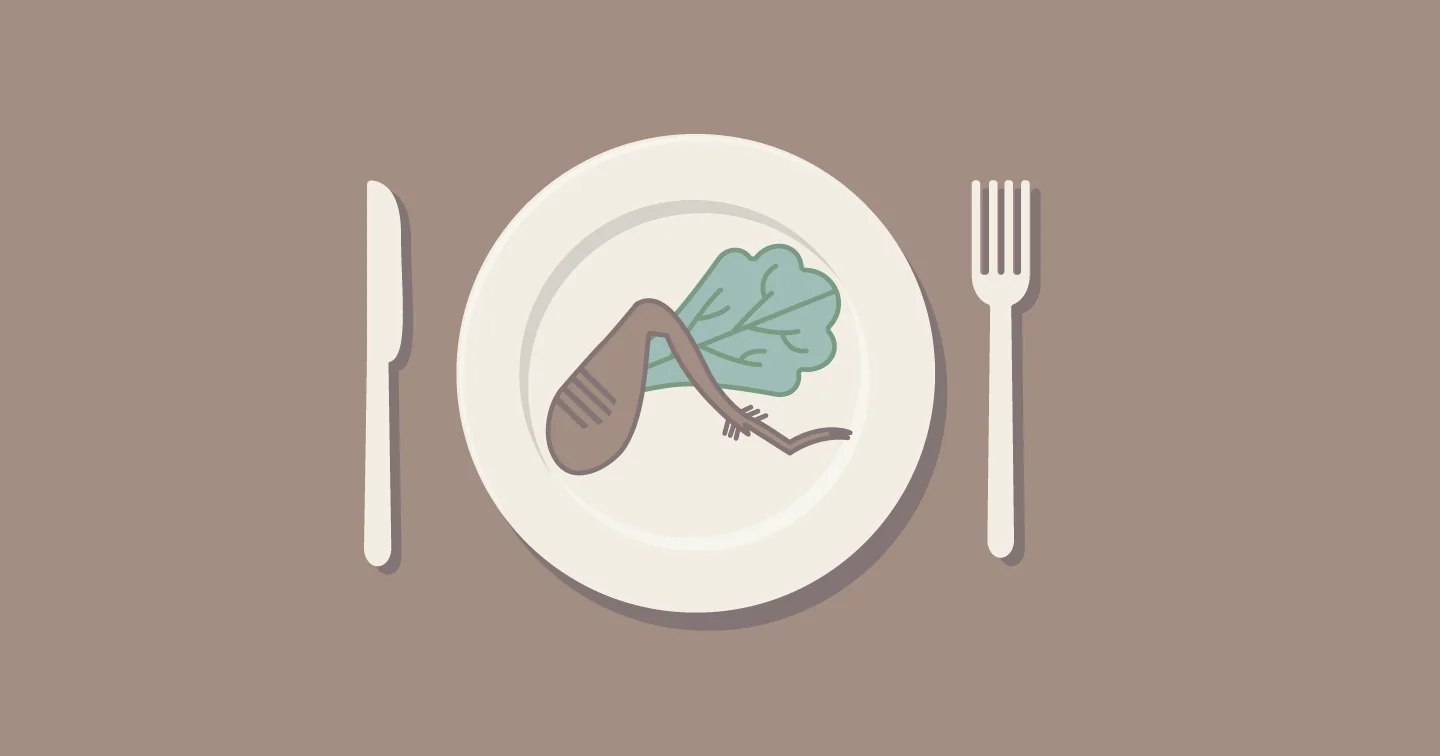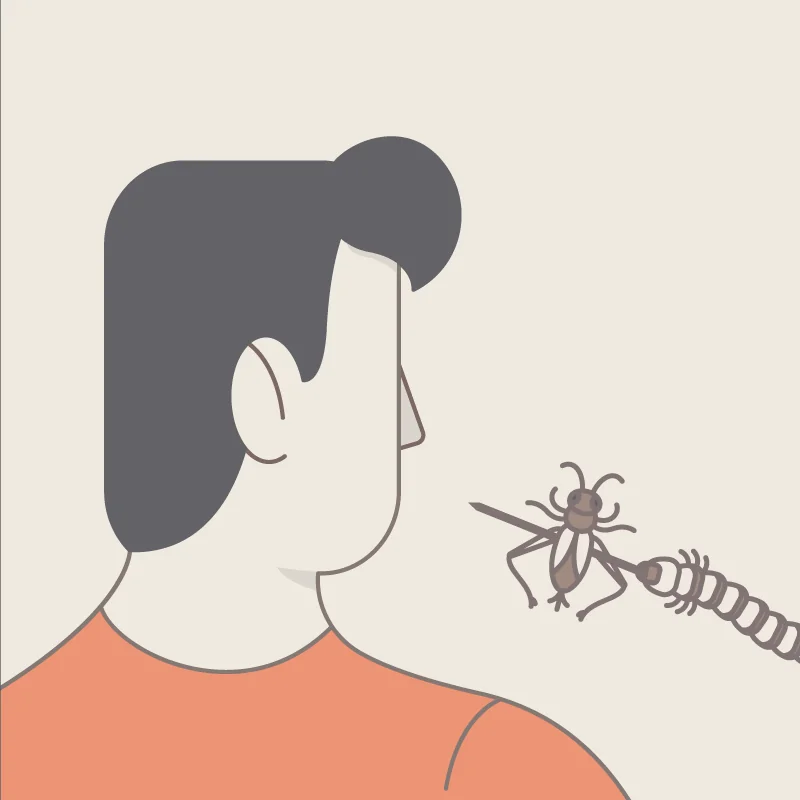Happy day to you my healthy friend!
If you're like most people, if you see a plate full of insects, you most likely don't feel like eating anymore.
However, that's not what this blog post is all about 😉
Slowly but surely, the future is coming and edible bugs are a part of it.
Edible insects are an essential part of the sustainability puzzle.
This blog post sets out to explore the following questions around insect protein.
- Are edible insects a good source of protein?
- Which edible insects have the most protein?
- Is it true that we can get more protein by eating insects instead of meat, eggs or plants?
- Can eating insects provide human body with the same quality protein as meat, eggs or plants?
- What are the benefits of eating protein rich bugs?
- Is it possible to build muscle and strength by eating protein rich insects?
- Is it possible to lose weight by eating protein rich insects?
Let's start.
Are edible insects a good source of protein?
Edible insects are a great source of proteins that can help you lose weight, gain strength, and build muscle mass.
But what does a “great protein source” mean?
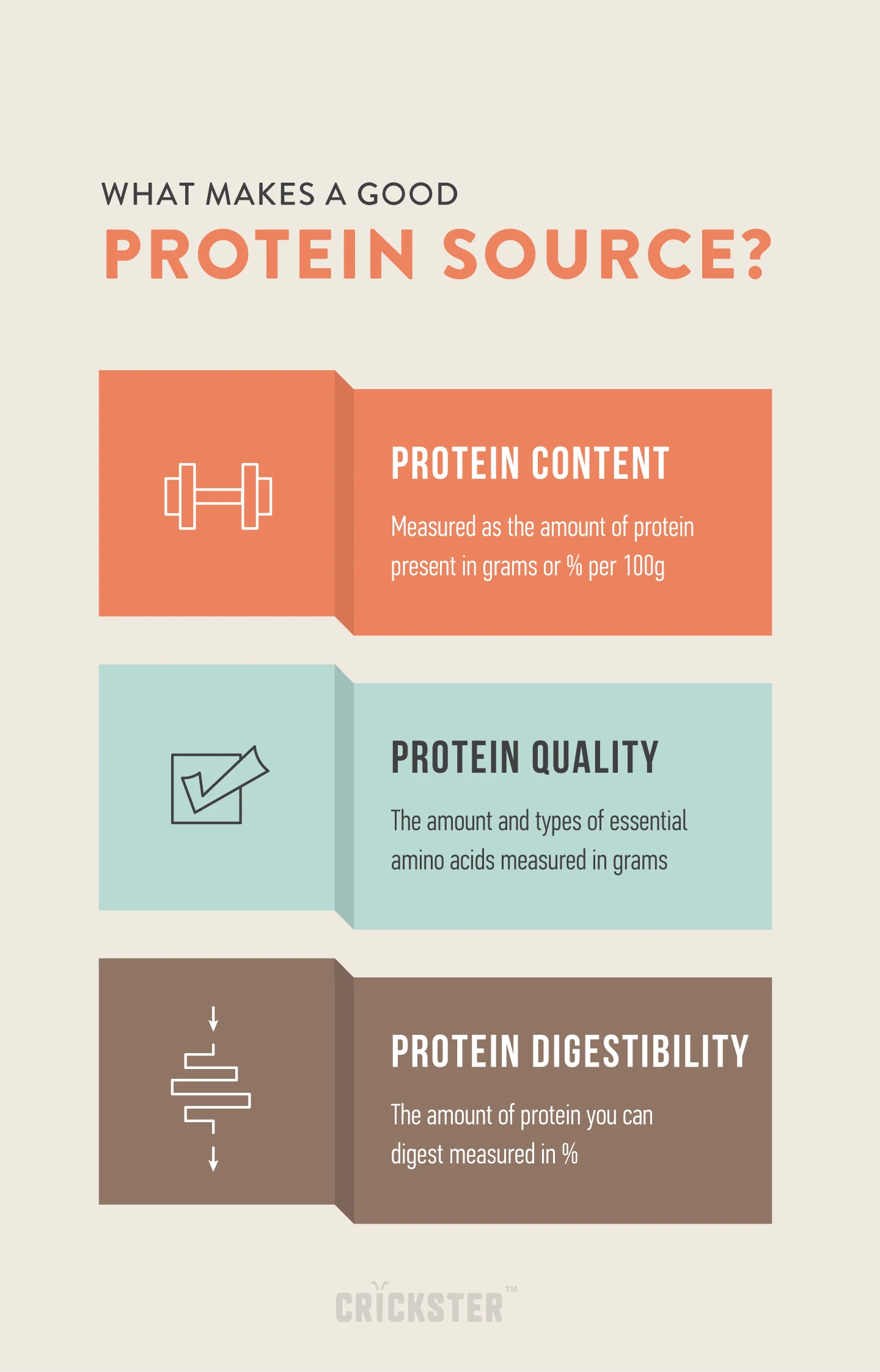
The quality of a protein source depends on three things:
- Protein content (measured as the amount of protein present in grams or % per 100g)
- Protein quality (The amount and types of essential amino acids measured in grams)
- Protein digestibility (The amount of protein you can digest measured in %)
We will look into the protein content, quality and digestibility of different edible insects. To discover which bugs are the best source of proteins.
Let’s begin with protein content.
Protein content of edible insects
Edible insects contains in general high amounts of protein.
The protein content for dried edible insects can range from 7-91 % [1,2,3,4] for wild caught edible insects and 38-76% for farmed insects [5,6,7]
The average protein content of dried edible insects is around 60% protein [4]
The big variation in the protein content for edible insects is due to:
- The edible insect specie (grasshoppers, butterflies, beetles etc.).
- The developmental stage (egg, larvae, pupae, nymph or adult).
- What they eat.
- What environment/climate they live in.
- How we process them (e.g. drying, boiling or frying).
- The method used to analyze the protein content.
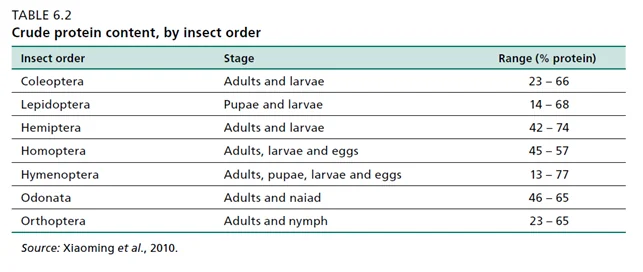
With a variation this big, you might be asking, how can I choose an edible insect with a high protein content?
Which edible insects have the most protein?
You can get your hands on the edible insect with the most protein by following these 4 guidelines:
- Chose a specie high in protein including crickets, grasshoppers and locusts [8,9]
- Chose adult edible insects. Adult edible insects usually have higher protein content than when they are in egg, larvae or pupae form. [10]
- Chose farmed insects with documented nutritional composition.
- Chose dry-roasted or freeze-dried edible insects over fresh insects.
Okay. All this is great, however is it true we can get more protein by eating insects over eating meat, eggs or plants?
Many commercial food products contain protein derived from legumes, yet insect protein might be a better choice.
Edible insects are richer in protein (60% protein) than beans (23.5%), lentils (26.7%) or soybean (41.1%) [4,11]
Likewise, edible insects are also higher in protein content compared to chicken (43% protein), egg (46%) or beef (54%). On average, only fish (81%) surpass insects in protein content [11]
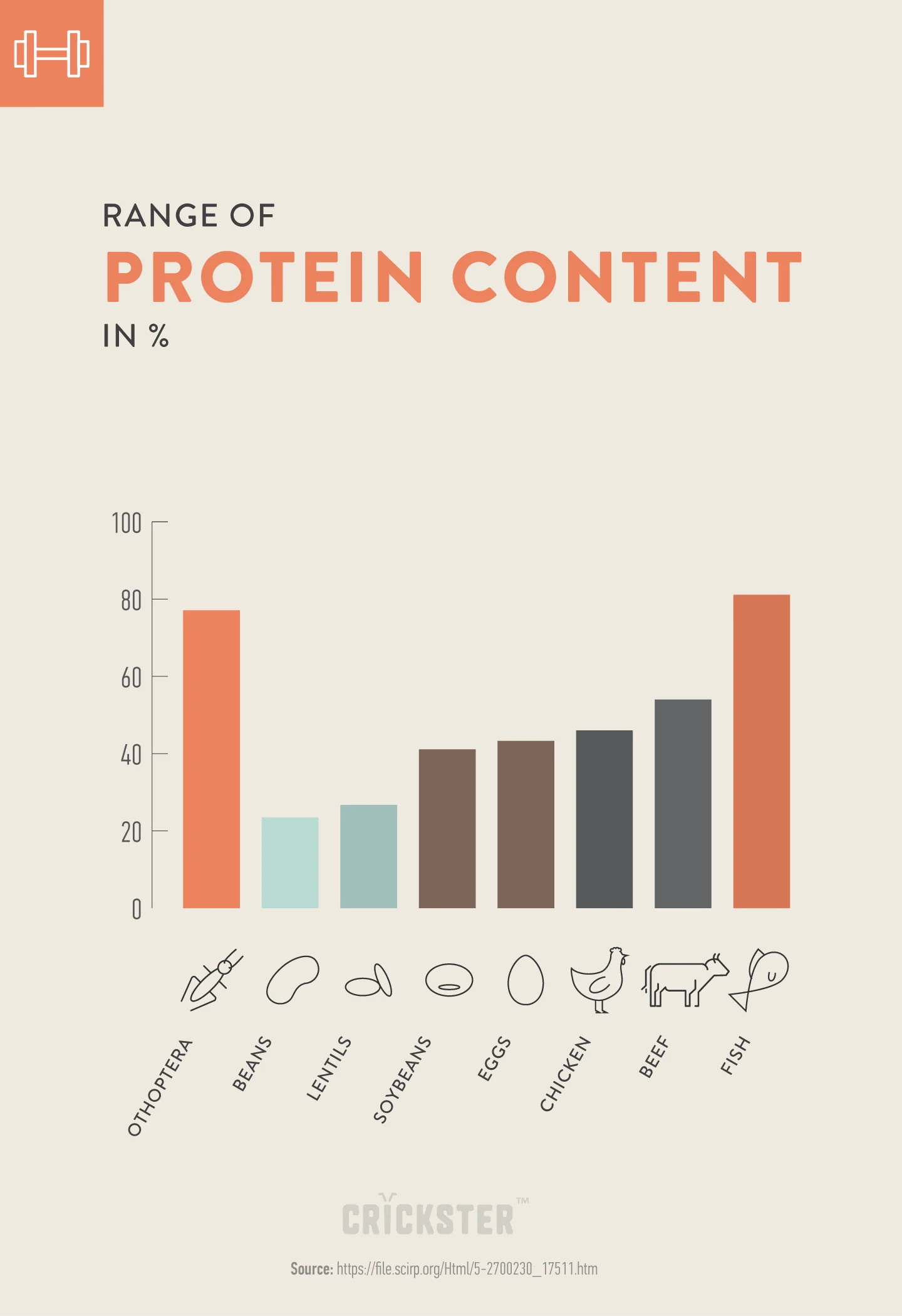
Bottom line:
Edible insects have high protein content up to 91 %.
To make sure you get a high protein edible insect. You can buy dried and fully matured crickets, grasshoppers or locusts from a trusted commercial farm.
Now that we know edible insects are high in protein, how does the quality of that protein then look like?
Protein quality of edible insects
The protein quality depends on the type of amino acids present (essential or nonessential) and whether quality fulfill human needs.
Amino acids are the smaller building blocks required to create all the larger protein building blocks of the body.
There are 20 different amino acids, where eight are essential, meaning the body cannot make them and must get them through food.
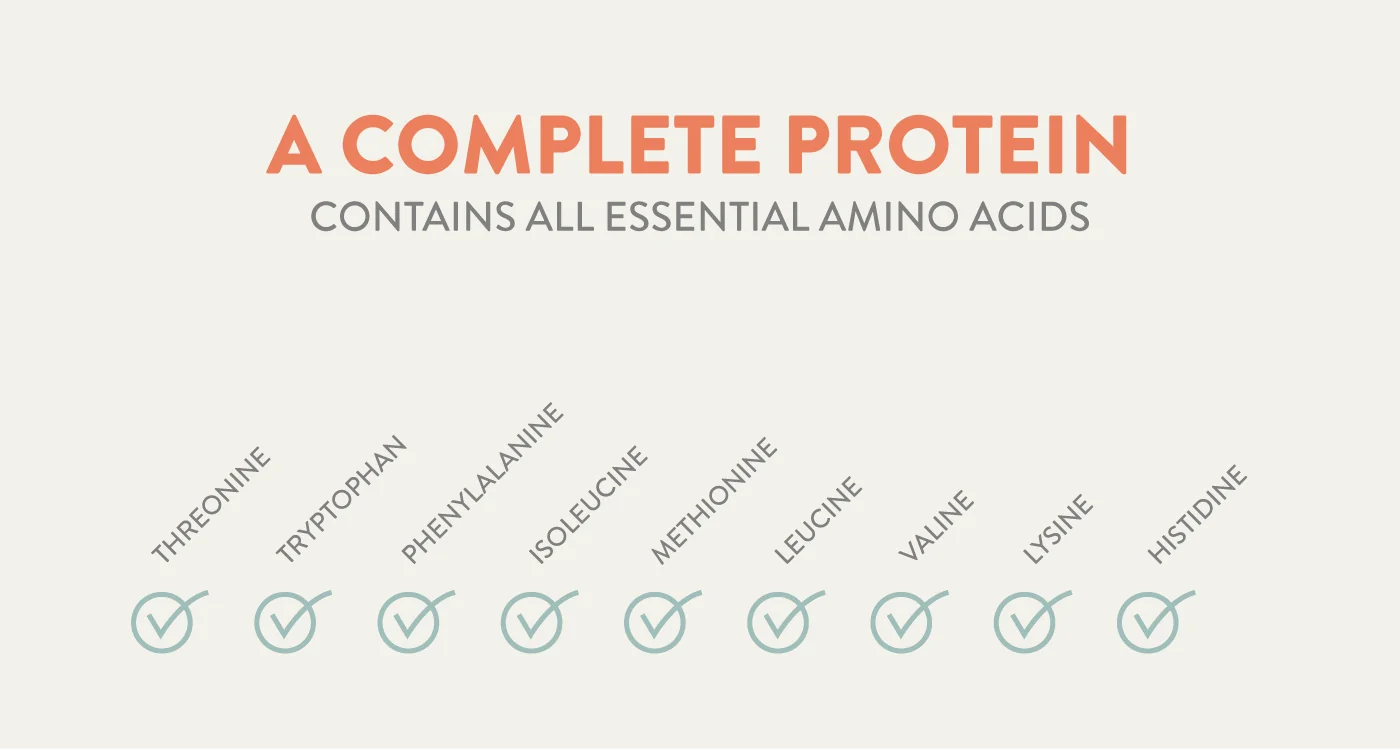
The eight essential amino acids are: phenylalanine, valine, threonine, tryptophan, isoleucine, methionine, leucine and lysine. [12]
In addition to being rich in protein, edible insect protein has a good amino acid profile.
Edible insects contain all essential amino acids. Including high amounts of the essential amino acids phenylalanine, tyrosine, lysine, tryptophan and threonine. [12,13]
The only exception are flies (diptera) that do not meet the human requirements for cysteine. [13]
Also, true bugs (hemiptera) tend to be low in isoleucine, lysine, phenylalanine, tyrosine, and valine and flies (diptera) tend to be low in leucine and cysteine.
Analysis of almost a hundred edible insect species show the essential amino acids represents 46–96% of the total amount of amino acids [14,15].
Considering the amino acid analyses are shown in Table 3 for 4 commercially farmed insects; crickets, mealworms, superworms, waxworms. It appears that edible insects are a good source of most of the essential amino acids.
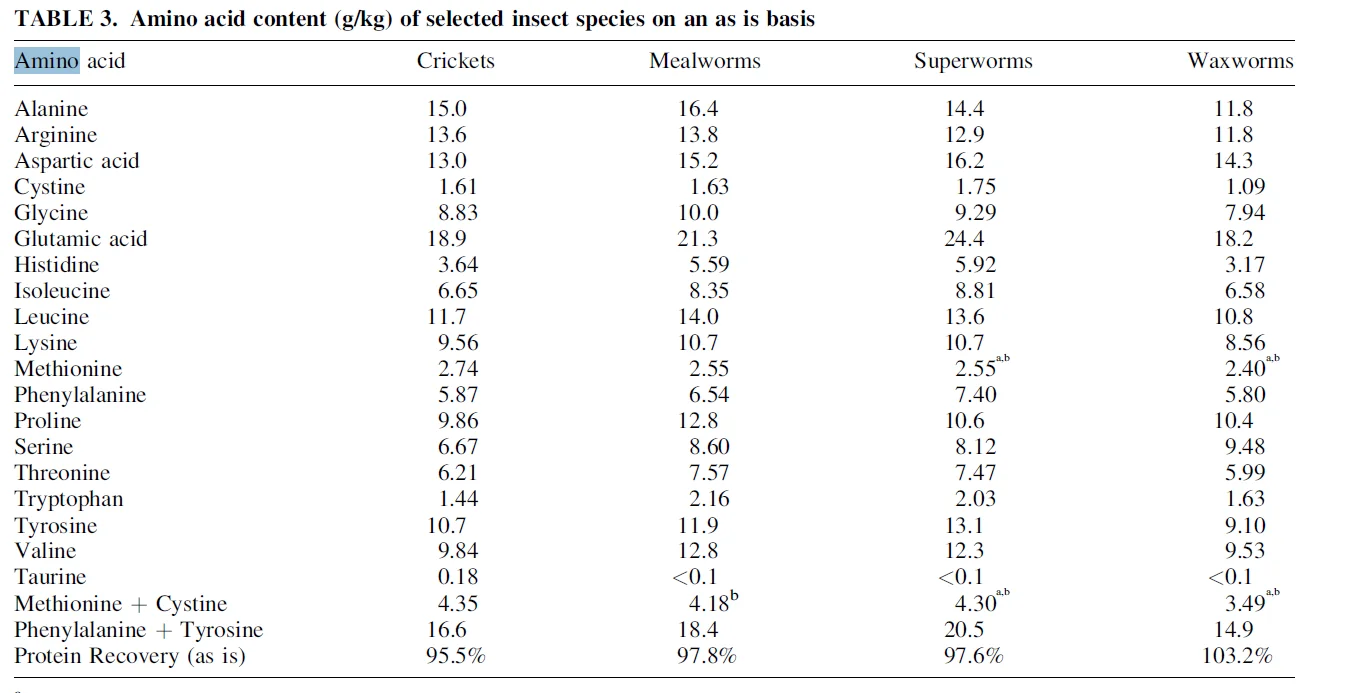
Alright, insects are a good source of quality protein. But how does edible insects compare to the protein quality of meat, eggs or plants?
When compared to plant proteins and meat proteins, insect proteins have high levels of high quality proteins in terms of nutritional value. Of the total protein content between 50-80% are essential amino acids [3,12]
For example the essential amino acid content of mealworms, super mealworms and buffalo worms (Tenebrio molitor, Zophobas morio and Alphitobius diaperinus) were similar to soybean and cow milk protein [16]
Scientist found similar results when analyzing 236 edible insects, which also have good essential amino acid profiles comparable to soy and cow milk protein [12]
Bottom line:
Edible insects are a high quality protein source and in general provide the same quality protein as animal sources.
Most edible insects contain high amounts of the essential amino acids necessary to fulfill all your body’s needs.
Protein digestibility of edible insects
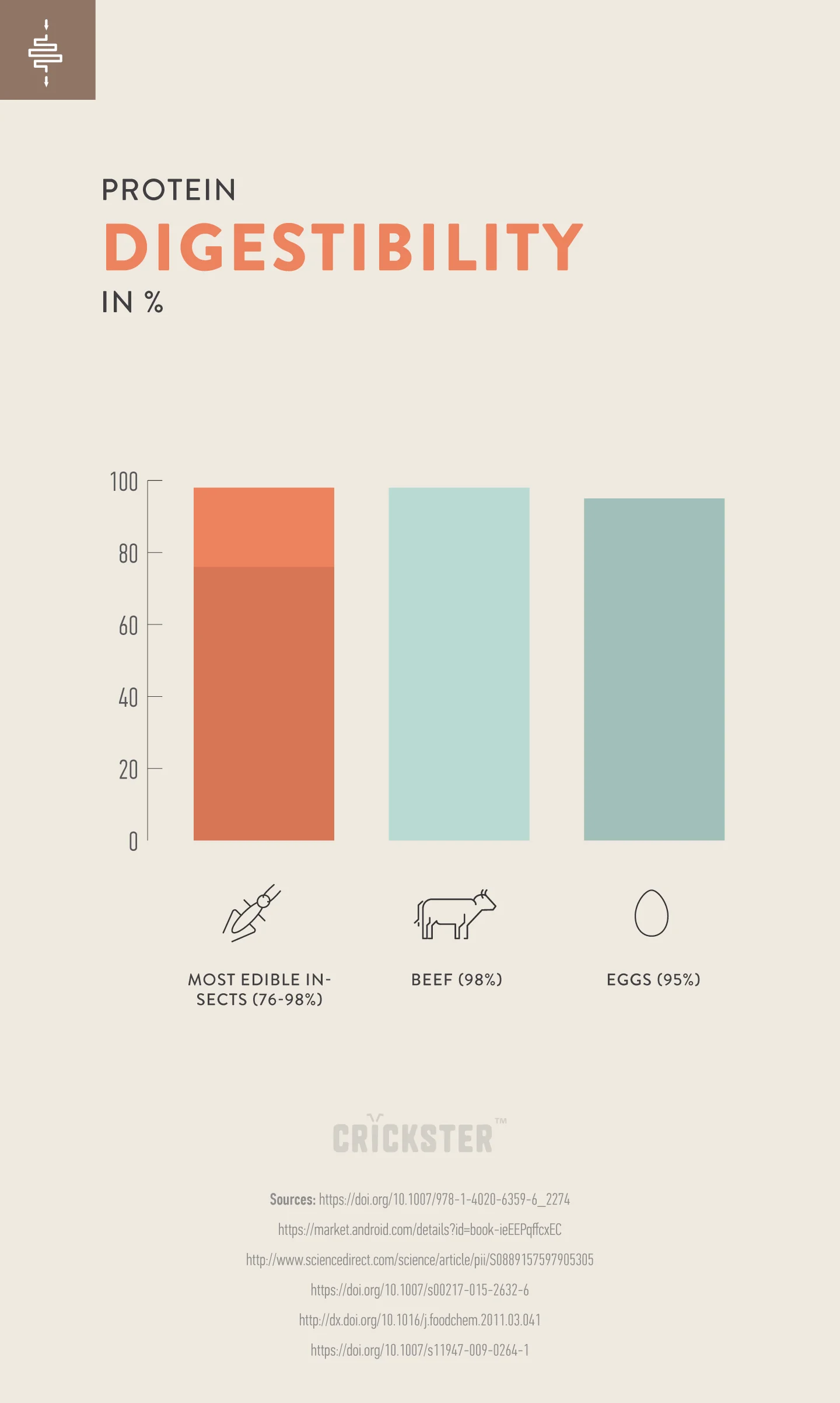
The protein digestibility depends on how much of the amino acids present in the food that your body can absorb.
Insect protein digestibility ranges from 54-98%. [1,17,18,19] This is the same or smaller than egg protein (95%) and beef (98%), but higher than the case of many plant proteins. [2,20]
In general, the protein digestibility of edible insects is between 76-98 % [1,18,19]
One way to increase the protein digestibility of edible insects is by removing chitin, the fiber that makes up the exoskeleton. [21]
Due to legislation it hasn't previously been legal to make extractions from edible insects.
This changed in 2018, when edible insects entered the list of the novel foods.
Producers are now allowed to remove chitin and increase the digestibility to that of other animal protein sources.
Bottom line:
Insect protein digestibility is the same or smaller than that egg protein and beef, but higher than most plant based sources.
The relatively high digestibility of insect proteins makes them a great addition to your diet.
With the new legislation we will soon see insect protein powders with digestibility scores of 95% and above.
What are the benefits of eating protein rich bugs?
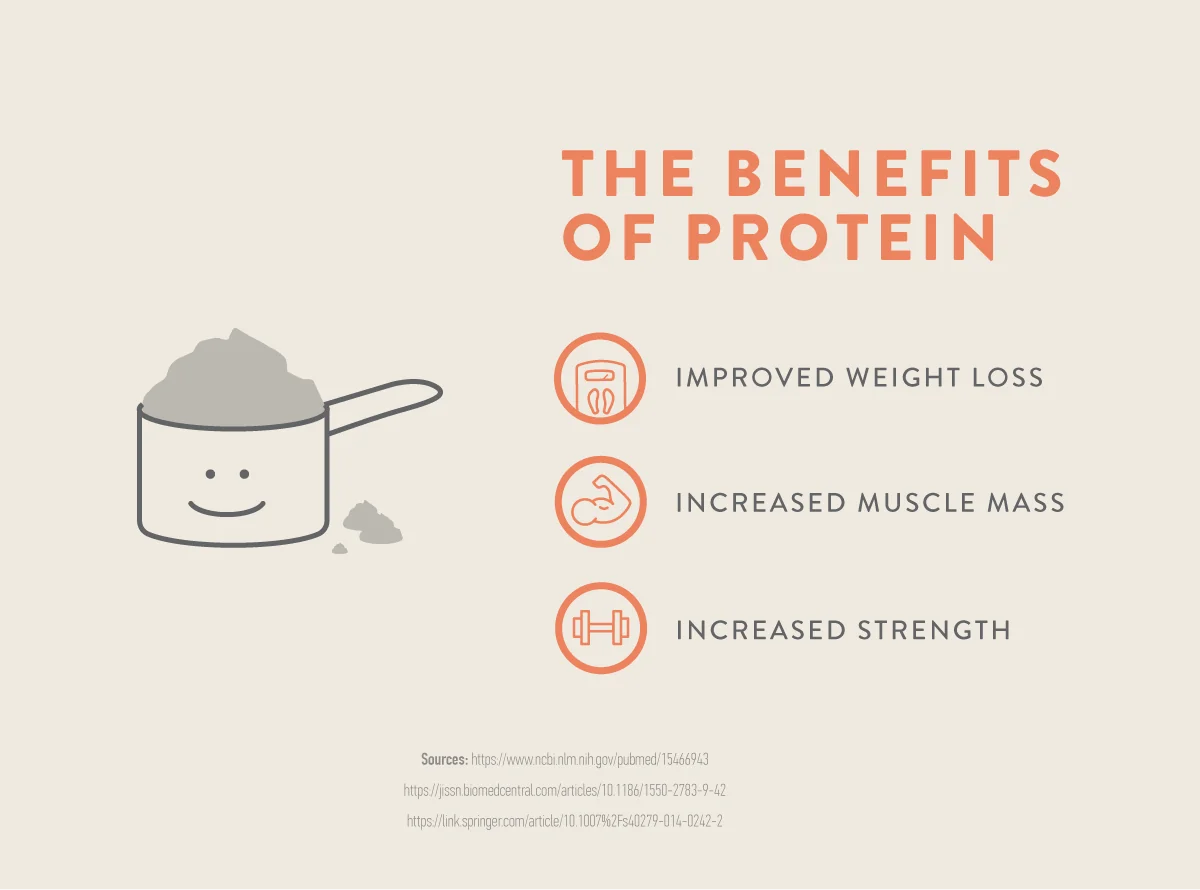
There are numerous health benefits of eating protein rich bugs. Including weight loss, building muscle mass and strength.
These benefits are mainly due the high protein content found in edible insects.
However, eating edible insects also provide other benefits. Like helping with brain development, improving gut health and reducing inflammation. [4,22,23] These benefits come from the high levels of other micro- and macronutrients present in edible insects.
You are likely eating enough protein to prevent protein deficiency. Even though, you could experience great health benefits with a higher protein intake.
Several studies have shown a high-protein diet has major benefits for losing weight, building muscle mass and strength (24,25,26,27).
Is it possible to build muscle and strength by eating insects?
The short answer is, yes it's possible to build muscle eating insects.
We have already established that edible insects are a great source of protein, when it comes to content, quality and digestibility.
Several studies show that eating plenty of protein (2,2g per kg of body weight per day or more) can help increase muscle mass and strength, while also keeping you lean. [24,25]
This alone won’t make you bigger or stronger. You’ll still have to put in the work through frequent trainings.
Keeping protein high can also help prevent muscle loss during weight loss [28, 29, 30].
Alright, it’s good to increase my protein intake for increased muscle mass and strength.
But how many protein rich bugs do I need to eat to experience these benefits?
Let say you weigh 75 kg. Then you would daily need to consume 165g of quality protein. You could get that from 234g of dried cricket powder.[6,7]
Combined with a challenging training program. You would likely also experience the benefits of increased muscle mass and strength. [24,25]
Bottom line:
Edible insects are a great source of protein.
A high protein intake from edible insects can help you gain muscle mass and strength, and can reduce muscle loss when losing weight.
Is it possible to lose weight by eating protein rich insects?
The short answer is yes.
Here are 4 ways of how protein rich insects can benefit you when you want to lose weight
1. Protein rich bugs can reduce hunger and appetite
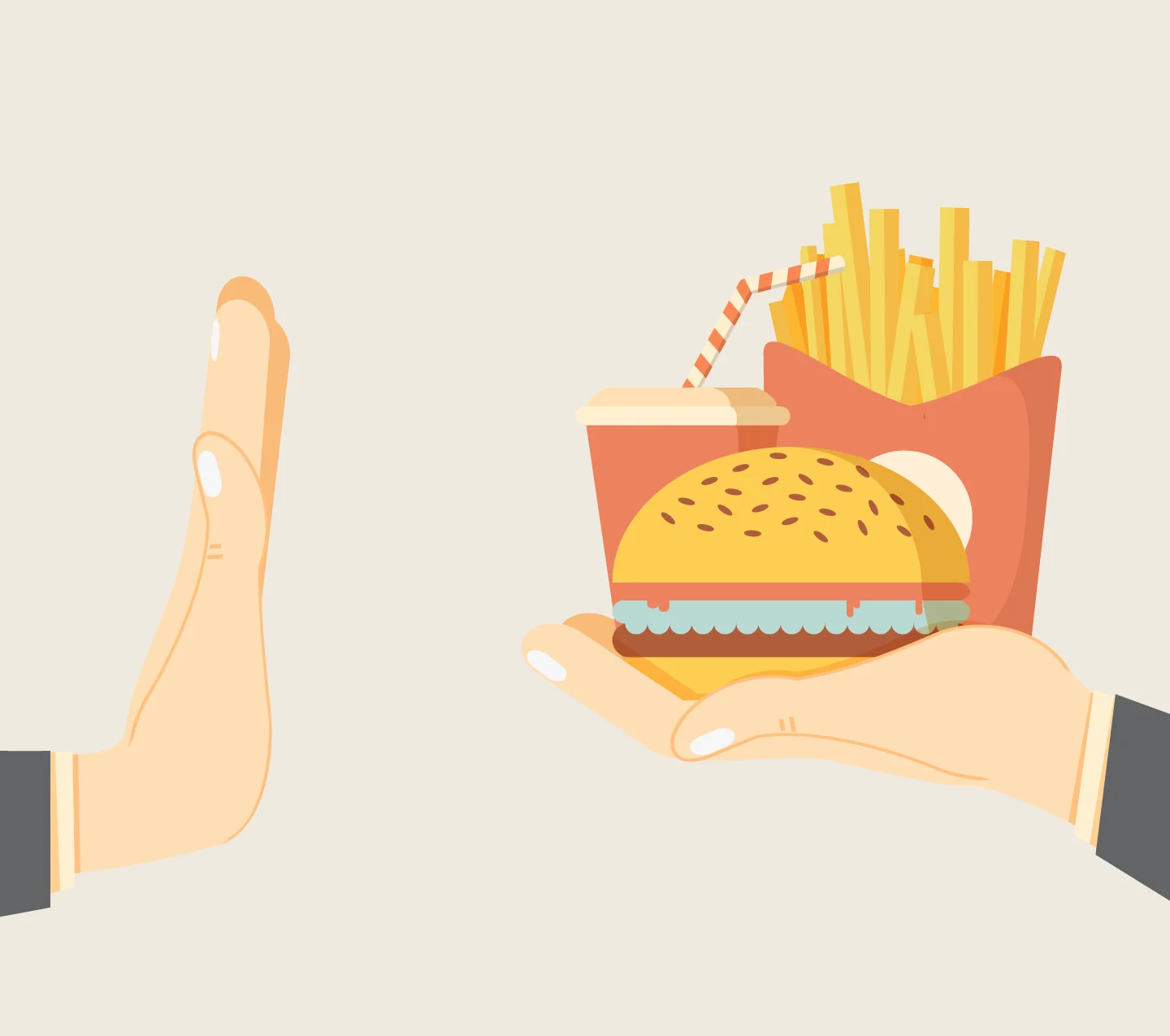
When we eat food we get macronutrients in the forms of fat, protein and carbohydrates.
These macronutrients affect our bodies in different ways.
For example, scientist have found that protein helps you feel more full, with less food. [31]
Protein reduces the level of your hunger hormone ghrelin and increases the satiety hormone peptide YY. This combination makes you feel full, with less food. [32,33,34]
One study found that increasing protein from 15 to 30% of calories made overweight women eat 441 fewer calories each day. This was without intentionally restricting anything. [35]
So next time you are creating your meal and you need to lose weight. Then you can consider replacing some carbohydrates and fats with sources of protein.
You can make it as simple as adding a few extra servings of meat or protein rich insect, while reducing the amount of grains or tubers.
Bottom line:
A diet high in protein reduces hunger, helping you eat fewer calories.
This is due to improved function of some of your weight regulating hormones.
2. Protein rich insects can help reduce your cravings and late night snacking adventures.

When you are craving a food, you are actually not hungry, at least in the traditional sense.
Food craving isn't only about your body needing energy or nutrients, it's about your brain needing a "reward". [36]
We all know that cravings can be hard to control. The best way to overcome them may be to prevent them from showing up in the first place.
Studies have found that one of the best ways to is to increase your protein intake.
One study done on overweight men showed that increasing protein to 25% of calories reduced cravings by 60%, and reduced the desire to snack at night by half. [37]
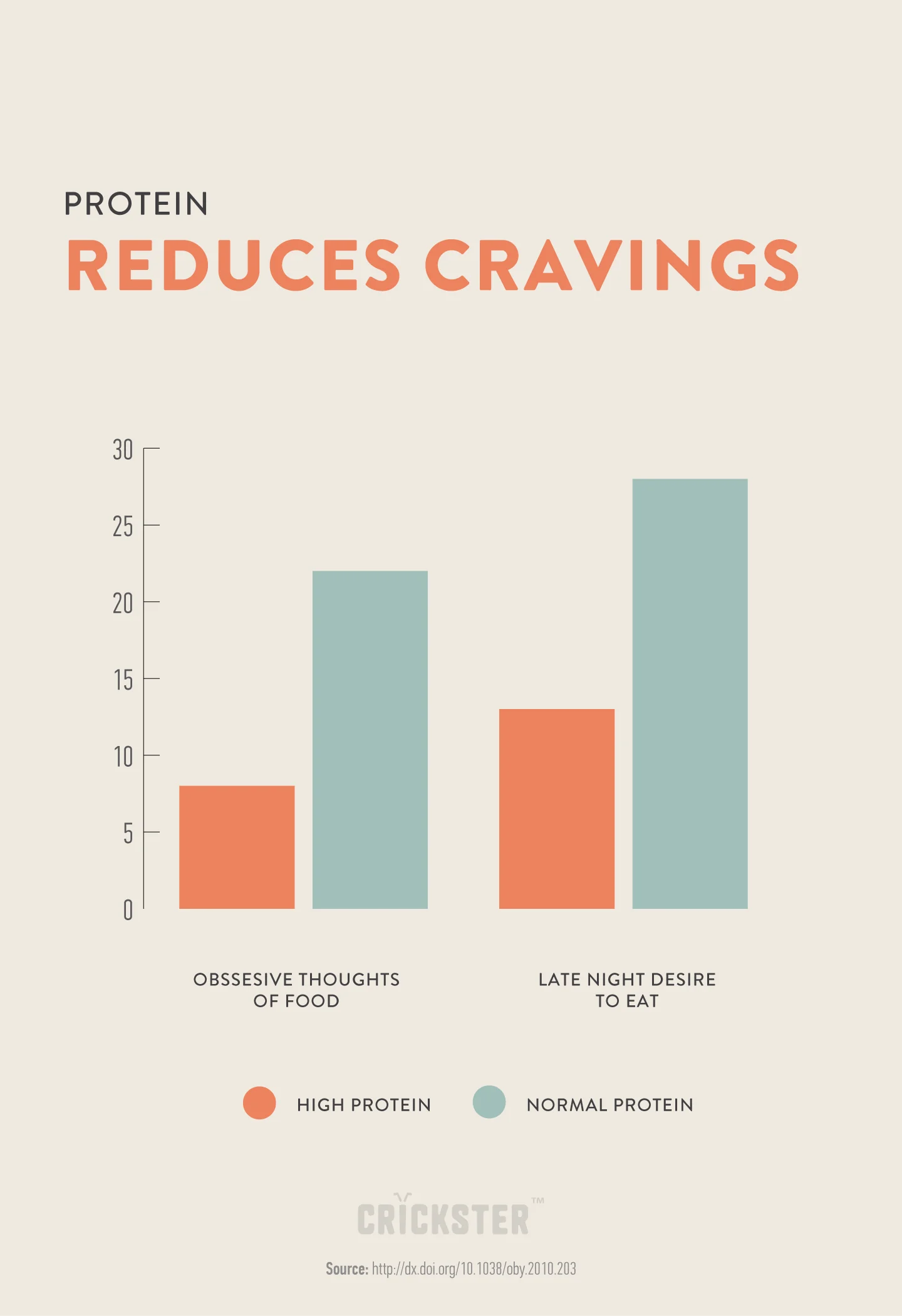
The blue bar on the graph is the high-protein group, and the red bar is the normal-protein group. As you can see, increasing protein intake reduce cravings and late-night snacking.
Another study done on girls also found that eating high-protein breakfast similarly reduces cravings and late-night snacking. The scientist think is this is due to an improved function of dopamine, one of the main brain hormones involved in cravings and addiction. [38]
Next time you are preparing your breakfast smoothie consider adding a scoop of cricket protein powder. You will most likely experience a day with fewer cravings and late night snacking.
Bottom line:
Eating more protein reduces cravings and desire for late-night snacking.
You could even experience these benefits from only eating a high-protein breakfast.
3. Protein rich insects can boost your metabolism and increase fat burning
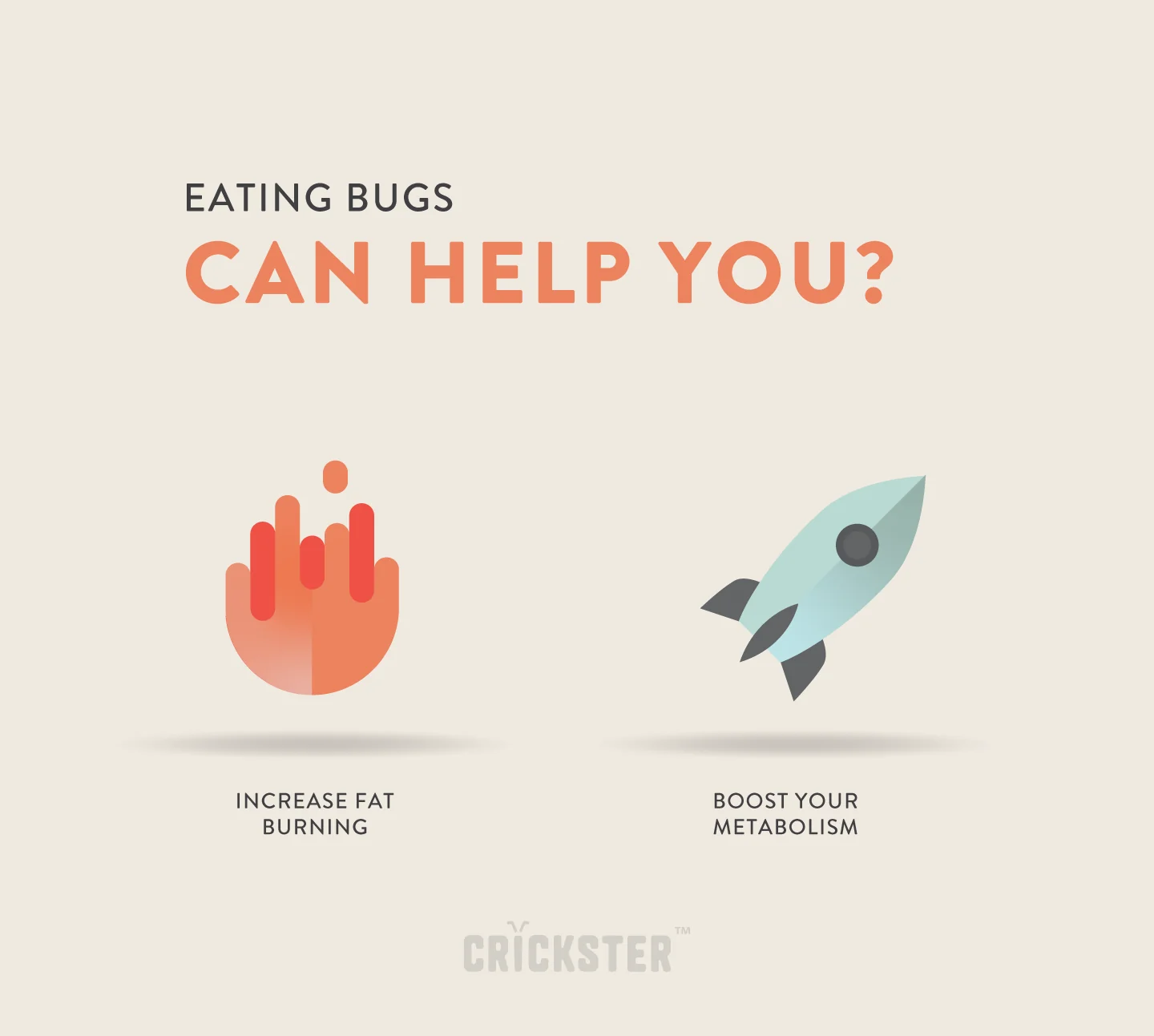
Whenever you eat food you increase your metabolism for a short while.
That's because the body use energy to digest the foods you eat. We describe this as the thermic effect of food.
Yet, not all macronutrients have the same thermic effect. Protein has the highest thermic effect (20-35%) compared to fat or carbohydrates (5-15%). [31]
A high protein intake can boost your metabolism and increase the amount of calories you burn. This can fast amount to 80-100 more calories burned each day. [39,40,41]
Edible insects are an easy way to increase your protein intake, without eating more fats or carbohydrates. 100 grams of dried grasshoppers will provide you with 76 grams of protein, 13 grams of fat and 2 grams of carbohydrate. Let the calories burn! [7]
Bottom line:
Increasing your protein intake can boost your metabolism and help you burn more calories throughout the day.
4. Protein rich bugs can help you lose weight and keep it off for good.

Protein is an excellent nutrient if you want to lose weight.
We have already established a diet high in protein boosts your metabolism and leads to an automatic reduction in calorie intake and cravings. [37,39,40,41,42]
So it makes sense you can start losing weight automatically, when you increase your protein intake. [35,43]
Overweight women lost 5 kg in 12 weeks, without intentionally restricting anything, simply by getting 30% of their calories from protein. [35]
Protein can also benefit you, when you intentionally want to restrict calories.
130 overweight people was on a calorie-restricted diet for 12-months. One half was on a high protein diet and the other half was on a normal protein diet. Both groups were eating the same amount of calories, but the high protein group ended up losing 53% more body fat than the normal protein group. [44]
We have all tried to lose weight, only to put it all back on a few months later again.
So the challenge is, how do you maintain your weight loss?

Luckily, scientist have discovered that even a small increase in protein intake can help you with maintaining your weight.
Increasing protein from 15% to 18% of calories, reduced weight regain by 50%. [45]
It appears if you increase your protein intake slightly it will help you lose weight, keep it off and prevent you from becoming obese.
Bottom line:
Protein has several health benefits and even just a small increase can help you lose fat and keep it off.
Let’s wrap up
Edible insects are a great source of protein, when it comes to content, quality and digestibility.
The edible insects with the highest protein content includes crickets, grasshoppers and locusts.
Edible insects contain the same amount of quality protein compared to eggs and meat, but are superior to most plant based protein sources.
There are many benefits of increasing your protein intake with edible insects. Benefits like weight loss, increased muscle mass and strength.
Even with the added health benefits a higher protein intake might not be necessary for you.
Most people, already eat around 15 % of your calories from protein (more than enough to prevent deficiency).
Yet, you might benefit from eating more than that, or up to 25-30% of calories, if your goal is to lose weight, build muscle mass and strength.
I hope you learned something today about how edible insects can benefit you.
Now I would love to hear from you:
Let me know if there’s something else that you’d like to know.
Would you consider eating insects as an alternative to meat?
Let me know by leaving a comment below and i’ll give you a heads up ASAP 😉
